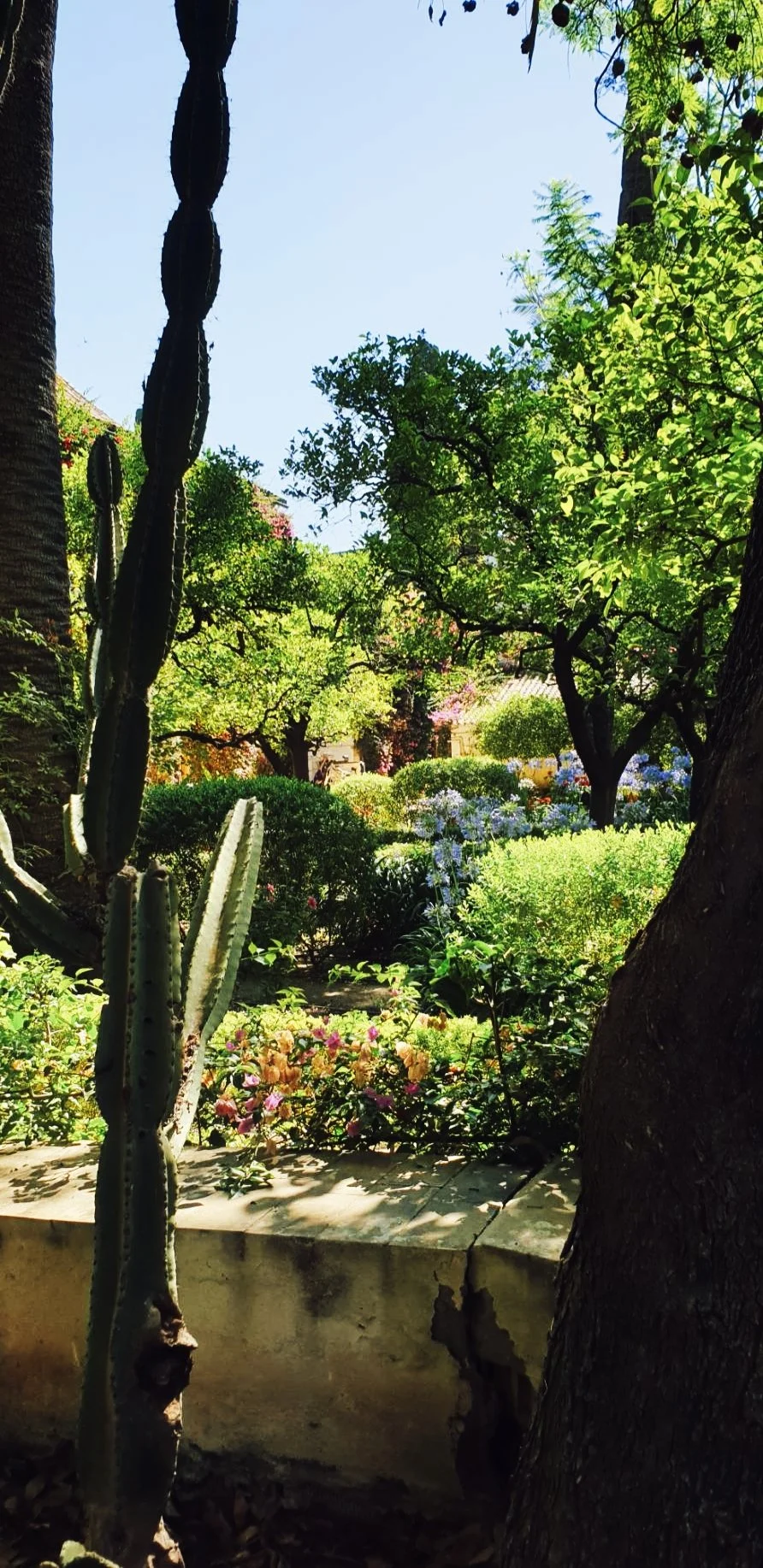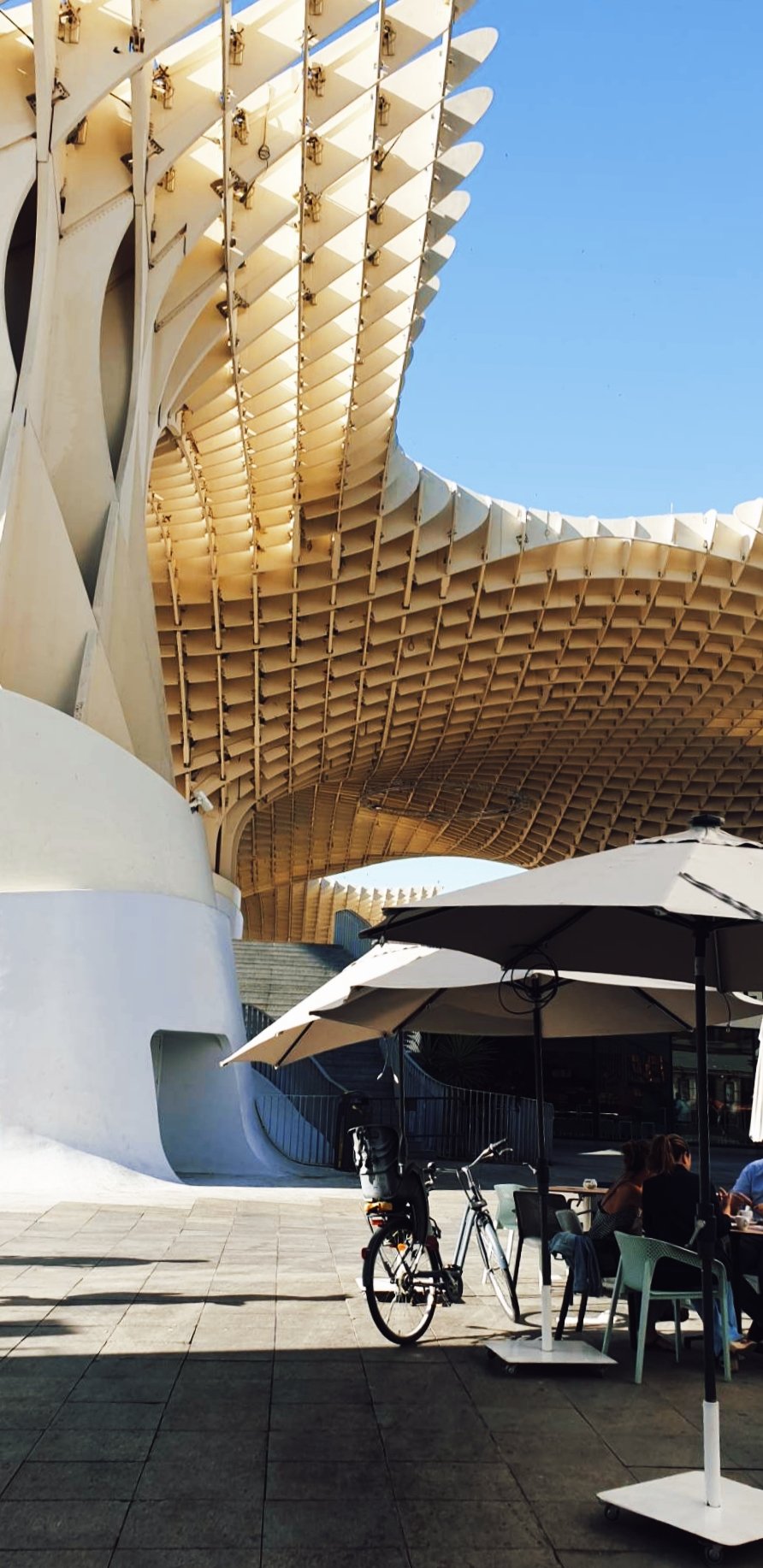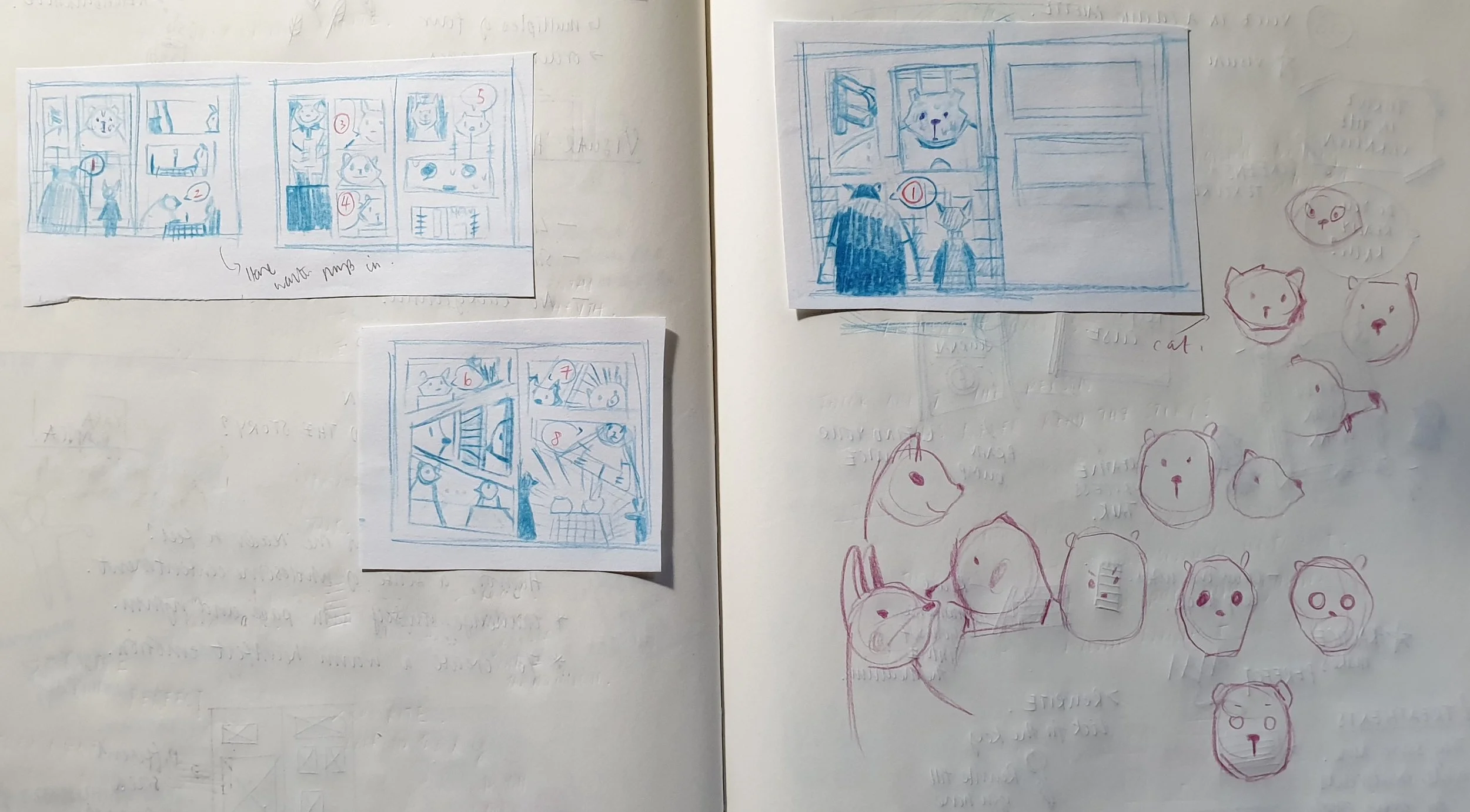How to create a graphic novel in 3 steps.
Want to create your own graphic novel?
In July 2022, I was lucky enough to attend a three-day graphic novel workshop in Seville, taught by the amazingly talented Fran Meneses and Ed Pavez.
Prior to the workshop, I had never created a graphic novel - the only experience I had to go off was my teenage summers of reading tonnes of manga.
So, if you want to create your own graphic novel from scratch, here’s my process with plenty of useful tips to help you along the way!
** IGNORE MY INCREDIBLY SHELL-SHOCKED FACE AS FRAN TELLS ME I NEED TO FINISH MY GRAPHIC NOVEL 😂 I WAS JUST IN AWE OF HER.Step 1: Write the treatment 📝
A treatment, is often used for screenwriting, so I was quite shocked to learn it’s also used in graphic novels. For a graphic novel, a treatment is a short summary of the whole story.
“Treatments (especially for graphic novels) tend to move quickly. So while a treatment for a film could be pages long, a treatment for a short comic like this may only need to be a paragraph.”
For the workshop, to help us get off a blank page, Ed had us write a short childhood memory, then we swapped! From this childhood memory, we then had to come up with a treatment. If it’s your first time creating a graphic novel, I highly recommend doing this. There’s something about mining someone else’s experience that allows you to be more creative!
At the end of the day and after much help from classmates, Ed & Fran, I edited it to the final version:
BEAR is staring at himself in the mirror, “Do not mess this up” he says to himself. Candlelight, with gentle jazz. RABBIT is glowing. BEAR grows more anxious. The waiter seems to choose this moment to come over. “Carrot salad please” RABBIT smiles. “Oh wow that was quick. I’m the worst at ordering. Gosh. Chicken?” The chicken family next table over looks horrified. “Pork?” Pig Junior looks green. “TUNA?” Shouts BEAR, the goldfishes stop breathing. BEAR cannot move. “Make it two salads please.” RABBIT says gently, she puts her hand over BEAR’s and says “If you’re still hungry we can go to a nightmarket after”. Her eyes sparkle.
Top tips ✨
During the treatment stage, you should consider how to make the graphic novel both topically and visually interesting. While I’d never tried screenwriting or dialogue before, Ed shared some magic tips on how to make an everyday boring moment into something interesting.
Don’t start static - Treatments (for graphic novels) tend to have movement. Think of it like the beginning of a TV episode, rarely is there nothing happening in the opening.
Pick a golden thread - From your idea, pick a moment where there’s emotion - humour, sadness, etc. Then highlight or juxtapose this emotion. For example, a romantic date could be in a park or in at a wrestling match - which would be more entertaining? Is there something you could exaggerate?
Step 2: Write the script 💬
Now it’s time to flesh out the story and dialogue while following the plot points of the treatment you created.
“In the script, I made sure to include inserts for the cut scenes. I also numbered the dialogue, which helped me keep track of how much speech there was, to maintain a balance between dialogue and action.”
The numbers for the lines of speech also made it easier to plan out my speech bubbles when it came to the storyboarding the comic too.
Here’s my final script so you can get an idea of what I was working with when I headed into step 3.
-
Characters:
BILLY - Brown bear
AVA - White rabbit
1. INT. RESTAURANT BATHROOM - NIGHT
Cracked mirrors with stickers on them with fluorescent lighting and run-down wash basins.
2. INT. RESTAURANT - NIGHT
It’s a busy night with tea lights all around the tables. Gentle jazz in the background.
3. INT. AVA’S APARTMENT - NIGHT
Her sofa.
4. EXT. NIGHT MARKET - NIGHT
Super busy nightmarket next to the river with lots of lights and street stalls.
**SCENE ONE**
Billy is looking in the mirror, his face fur is slightly wet. A fox starts washing their hands next to him.
- *BILLY**
She’s cute. Don’t mess this up. You’ve got this. (1)
Billy sits back down.
- *BILLY**
So what… (2)
The waiter makes a beeline for their table.
- *WAITER**
Ready to order? (3)
- *AVA**
Carrot salad please. (4)
- *BILLY**
Oh wow that was quick. (5) I’m the worst at ordering. (6) Err chicken strips? (7)
INSERT: A close up of the couple (who are chickens) at the next table looking up from their food.
- *BILLY**
Barbecue ribs? (8) Tuna steak? (9)
INSERT: Snapshots of the group of piglet friends. Then to two fish in their bowls having dinner together.
- *BILLY**
SALAD. (10)
Billy slams his paws on the table, the restaurant goes silent. The waiter’s eyes are huge.
- *BILLY**
Can you (sighs) make that 2 salads? (13)
- *AVA**
Don’t worry if you’re still hungry we can get something else. (14)
Billy looks at Ava and smiles for the first time.
**SCENE TWO**
A mushroom lamp turns on. The banana phone rings, Ava picks up.
- *AVA’S V/O**
Hey, just caught me. Back now. You didn’t tell me he was a bear.
INSERT: A scene of a river at night.
- *AVA’S V/O**
Yeah he was super weird at the restaurant. Tried to eat everyone.
INSERT: Night market comes into view
- *AVA’S V/O**
It was cute. I like him.
INSERT: The back of Billy and Ava sitting next to each other at a stall. Billy hunched over munching, with a stack of bowls next to him. Ava leaning slightly against him.
Final script
Characters:
BILLY - Brown bear
AVA - White rabbit
1. INT. RESTAURANT BATHROOM - NIGHT
Cracked mirrors with stickers on them with fluorescent lighting and run-down wash basins.
2. INT. RESTAURANT - NIGHT
It’s a busy night with tea lights all around the tables. Gentle jazz in the background.
3. INT. AVA’S APARTMENT - NIGHT
Her sofa.
4. EXT. NIGHT MARKET - NIGHT
Super busy nightmarket night to the river with lots of lights and street stalls.
**SCENE ONE**
Billy is looking in the mirror, his face fur is slightly wet. A fox starts washing their hands next to him.
- *BILLY**
She’s cute. Don’t mess this up. You’ve got this. (1)
Billy sits back down.
- *BILLY**
So what… (2)
The waiter makes a beeline for their table.
- *WAITER**
Ready to order? (3)
- *AVA**
Carrot salad please. (4)
- *BILLY**
Oh wow that was quick. (5) I’m the worst at ordering. (6) Err chicken strips? (7)
INSERT: A close up of the couple (who are chickens) at the next table looking up from their food.
- *BILLY**
Barbecue ribs? (8) Tuna steak? (9)
INSERT: Snapshots of the group of piglet friends. Then to two fish in their bowls having dinner together.
- *BILLY**
SALAD. (10)
Billy slams his paws on the table, the restaurant goes silent. The waiter’s eyes are huge.
- *BILLY**
Can you (sighs) make that 2 salads? (13)
- *AVA**
Don’t worry if you’re still hungry we can get something else. (14)
Billy looks at Ava and smiles for the first time.
**SCENE TWO**
A mushroom lamp turns on. The banana phone rings, Ava picks up.
- *AVA’S V/O**
Hey, just caught me. Back now. You didn’t tell me he was a bear.
INSERT: A scene of a river at night.
- *AVA’S V/O**
Yeah he was super weird at the restaurant. Tried to eat everyone.
INSERT: Night market comes into view
- *AVA’S V/O**
It was cute. I like him.
INSERT: The back of Billy and Ava sitting next to each other at a stall. Billy hunched over munching, with a stack of bowls next to him. Ava leaning slightly against him.
Step 3: Sketch out storyboard 🖍️
Now for the fun, visual bit!
“I used the numbered script to divide out the pages and decided how the dialogue developed across the spreads. Then got to work on roughly sketching out how I wanted to set up the tone, atmosphere and pace.”
In a very fun and fascinating way, it's quite intoxicating to have all this choice as an illustrator! So don’t rush your thumbnails, take your time!
How to fit dialogue onto a page
Here you can see where I’ve used the numbered dialogue to try and figure out how the pages will fit
Moving things around
You can cut out your roughs and move them around because you might open up a new composition.
Top tips ✨
How to illustrate the action, you can use line work in the background to highlight emotions, also remember you can think like a film maker and you can zoom in or pan out.
Negative space and lighting can have on the pace and mood. There’s lots of things to play with when it comes to shadows and flipping your colour palette around.
Extra seasoning for your graphic novel 🧂
Inserts are the extra frames where you can add more detail.
Remember that the average time to read a graphic novel page is 3 seconds, so visual hierarchy matters. Things to keep in mind:
Line work
Silence, pause
Dialogue
Background setting
Textures and scans
You can find my finished graphic novel here.
I hope these tips help you when creating your own graphic novel. Good luck!






